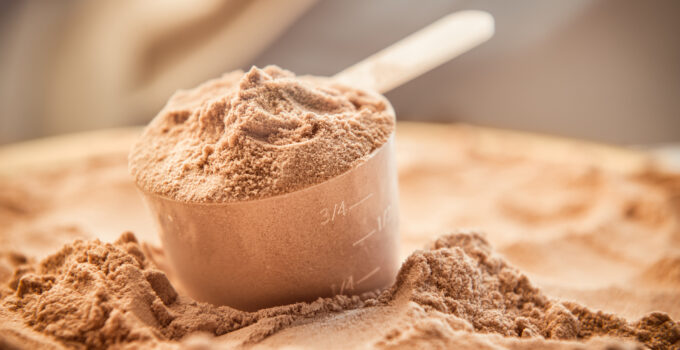Protein powders are extremely popular among health-conscious individuals. It comes in a variety of forms and is derived from a wide range of sources. Because there are so many options, determining which will produce the best results can be difficult. Whey protein is one of the best sources of protein supplements with a high nutritional value that has been proven by science to provide essential health benefits.
Whey proteins are commonly used by weight trainers and bodybuilders to supplement their regular diets because they promote lean muscle mass growth and aid in muscle protein synthesis. Read on to know different types of whey protein and how they function:
Page Contents
Types of whey protein
1. Whey concentrate
The concentrate is the most basic of the whey protein types. It is generally less expensive and easier to find because it is very popular for a variety of reasons!
A curdling agent, such as rennet or acid, is used, and the solid portion separates from the liquid. The solid curds are removed to be made into cheese or casein, and the liquid that remains is your whey. It’s whey concentrate at this point. It is healthier than other protein powders because it goes through fewer processes.
It contains a lot of complete proteins, but it also has some fat and sugar in the form of lactose. Surprisingly, that fat contains a plethora of highly beneficial nutrients that promote immune and cardiovascular health.
2. Whey hydrolysate

Source: au.myprotein.com
It is a pre-digested form of whey protein that contains 99 percent protein. Whey protein hydrolysate is available in two forms: concentrate and isolate. Nonetheless, some amino bonds have been broken as a result of heat, acids, or enzymes being applied to the proteins. It has the advantage of being absorbed more quickly in the stomach.
You get the fastest protein absorption because of the hydrolyzation, which acts almost as a pre-digestion process. In general, this means that your muscles will recover more quickly. Hydrolysate, on the other hand, does not typically contain all of the naturally occurring benefits that concentrate does. Furthermore, despite its high price, hydrolysate has a bad taste.
3. Whey Isolate
It contains 95 percent protein and only a trace of lactose and fat. The isolate is further processed and purified. It reduces the number of extraneous carbohydrates and fat. In order to increase protein content. As a result, isolate contains more protein than concentrate.
It does, however, have fewer naturally occurring benefits in terms of macro-and micronutrients. They are, in fact, destroyed in the final process.
Protects against eczema

Source: everydayhealth.com
The benefits of whey protein are not limited to adults. If this protein mixture is given to infants between the ages of 3-12 months, they are less likely to develop red, itchy skin and allergic reactions. Whey protein consumption, however, has no effect on resistance to these conditions once the child reaches adulthood.
Keep you fuller for long
Satiety is greatly enhanced by whey protein. Protein ranks first among all macronutrients in terms of satiety. It increases your energy expenditure, allowing you to consume fewer calories than you normally would have. If you eat a quarter of your daily protein requirement, you can reduce your hunger cravings by 60%, according to research. Whey protein consumption combined with weight training can help you lose up to 8 pounds of weight while increasing your lean muscle mass. Additionally, it reduces appetite and preserves lean muscle mass.
Regulate blood pressure
When consumed by hypertensive individuals, whey protein powder has been shown to be effective in lowering blood pressure. Additionally, it serves as a deterrent against the development of potentially fatal cardiovascular risks.
Increase muscle mass

Source: renegadefitnessmiami.com
Because it releases anabolic hormones like insulin, whey protein increases muscle mass and strength. Leucine in the substance stimulates muscle protein synthesis in our body. Your muscles will grow as a result of the protein and amino acids in this product. As compared to other protein sources, whey protein stimulates muscle growth more quickly.
Enhance the body’s antioxidant defense
When antioxidants are consumed, they help reduce oxidative stress in the body and reduce the risk of developing various chronic diseases. Human glutathione is one of the most important antioxidants. Glutathione, on the other hand, is a naturally occurring antioxidant that the body produces. When cysteine is in short supply, glutathione production is hampered. The body’s natural antioxidant defenses may be strengthened by high-cysteine foods like whey protein.
Aids in weight loss

Source: res.cloudinary.com
Protein consumption is a well-known weight loss strategy. Consuming more protein may aid in fat loss by:
- Whey protein reduces hunger and appetite.
- Whey protein may boost metabolism.
- Whey protein aids in the maintenance of a calorie deficit.
Treat Type 2 Diabetes
A chronic disease characterized by high blood sugar and impaired insulin function, type 2 diabetes is the most common form of diabetes. Blood sugar levels should be kept within healthy ranges by insulin, a hormone that is supposed to stimulate the uptake of sugar into the cells and keep them there. Blood sugar levels can be controlled by consuming whey protein, which has been shown to increase insulin levels as well as insulin sensitivity.
Conclusion
Whey protein is very simple to incorporate into a meal plan; it can be blended into smoothies, milkshakes, and yogurt, or it can simply be mixed with warm water or milk. The ideal recommended dosage is 1-2 scoops per day; however, always follow the package instructions. Be that as it may, not every person benefits from these powders. On the off chance that your eating routine is now wealthy in excellent protein, you probably will not see a lot of distinction in your personal satisfaction by adding protein powder.
In any case, competitors and individuals who consistently lift loads might track down that taking protein powder amplifies muscle gain and fat misfortune.
Protein powders can likewise help people who battle to address protein issues with food alone, for example, individuals who are sick, more established grown-ups, and a few veggie lovers or vegetarians
Whey protein hydroslate or isolate may be better than whey protein concentrate for people who are lactose intolerant. Before taking a protein supplement, it is always best to consult with a doctor.





